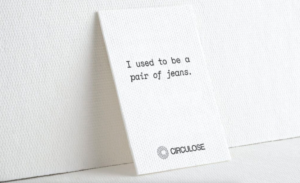My wife Susan and I were visiting a friend’s home this week and I noticed what appeared to be a branding iron embossed with his initials hanging on the wall. He shared that it was a gift from a friend enabling him to brand steaks he grilled.
That triggered an almost instant connection to the concepts of branding in companies, artists, and service providers. They all leave a mark on their products that distinguishes it or them from competitors and hopefully from copycats.
It turns out that mental connection was right: https://en.wikipedia.org/wiki/Brand
There you see the origin of branding irons was to prevent theft. I think we all are aware of cattle being branded so rustlers could be caught and the cattle they stole recovered. Knowing this traceability, clever thieves would simply slaughter the cattle in the fields and leave the hides behind.
Today, companies recognize that brand identity and differentiation are crucial elements in brand loyalty. Then, how do you differentiate a commodity like electricity or natural gas that are indistinguishable from providers. The only clear differentiator is price, right?
Some of you quick thinkers will respond insisting that it is the way electricity is made that differentiates the provider. Was it produced using solar, wind, hydro, nuclear. or fossil fuels? Others of you will remark that the time and duration of supply matters because the value of keeping the lights on for everyone changes all the time.
So, the value of the commodity depends upon the value of timely and reliable supply for a customer. Therefore, customers who are flexible about when they get their power should pay a lower price than those who simply want it available at the flip of a switch.
In every case, the energy provider leaves a mark on the minds and hearts of their consumers. Now that we define this objective, it seems to me that education and proof of your generation, delivery, and reliability excellence also define that mark.
Over the years, energy providers learned that one of the most important brand differentiators was their energy efficiency and demand response programs and services, which educated and enabled consumers to be participants in this brand identity.
I am not sure energy providers realize how important this is any longer. The mark being left today is the impression that the industry simply doesn’t care about these essentials any longer. The result is we reduce this all to price … it is moving back to a pure commodity.
Author: Captain Obvious
Death and Tax Certainties
Well, it’s that time of the year again that many of us dread … filing our state and federal tax returns. As attested to by one of our founding fathers, Benjamin Franklin, over 235 years ago in 1789, nothing is more certain in our lives:
“Our new Constitution is now established and has an appearance promising permanency. But nothing can be said to be certain in this world except death and taxes.”
However, the taxes Franklin was referring to were not income taxes. They were mostly sales taxes by the British and our government on goods being bought and sold here.
The history of income taxes in the United States is remarkable in that it is so recent. It was only 150 years ago (1862) that President Lincoln signed into law a revenue-raising measure to help pay Civil War expenses, creating a Commissioner of Internal Revenue and the nation’s first income tax. It levied a 3 percent tax on incomes between $600 and $10,000 and a 5 percent tax on incomes of more than $10,000. The income level threshold was an enormous amount of money back then so most paid little to nothing in taxes.
It may be surprising given how small this tax appears to us today, but there were terrible reactions to this new tax. By 1867, just five years after it was introduced, public opposition was so fierce that Congress cut the tax rate, and in 1872, the income tax was repealed. From 1868 to 1913, 90 percent of all tax revenue came from taxes on liquor, beer, wine and tobacco. Today, we would call these sin taxes. A few years later, prohibition killed that golden goose.
In 1894, the Wilson Tariff Act revived the income tax and an income tax division within the Bureau of Internal Revenue was created, but a year later, in 1895 the Supreme Court ruled the new income tax unconstitutional on the grounds that it was a direct tax and not apportioned among the states based on population. The income tax division was disbanded. So, what started in 1862 ended in 1895.
Then in 1909, just over 100 years ago, President Taft recommended Congress propose a constitutional amendment that would give the government the power to tax incomes without apportioning the burden among the states in line with population. Congress also levied a 1 percent tax on net corporate incomes of more than $5,000.
The arguments for and against taxes have provided full employment for accountants and lawyers. Just ask any accountant these days how complex the tax code is. Do you remember Herman Cain’s 2012 campaign called the 9–9–9 Plan? It called for the replacement of all current taxes, such as the payroll tax, capital gains tax, and the estate tax, with a 9% personal income tax, 9% federal sales tax, and a 9% corporate tax.
So, based upon this very quick review of tax history, I would hope you agree that taxes are far from certain. Being taxed is certain … we just aren’t sure how much and how it will be extracted. Each year most of us rely on professionals to tell us what this all means and what we must do to comply.
So, eat, drink and be merry! And enjoy one politician’s explanation of his position on alcohol. This funny and true story is from Armon Sweat, Jr., a member of the Texas House of Representatives. In 1952, Armon was asked at a campaign rally about his position on whiskey, which was a contentious campaign issue. From the Political Archives of Texas, what follows is his answer to the question about his stance on alcohol:
“If when you say whiskey, you mean the devil’s brew, the poisonous scourge, the bloody monster that defiles innocence, dethrones reason, and takes bread from the mouths of little children. If you mean that evil drink that topples Christian men and women from the pinnacles of righteous and gracious living into the bottomless pit of degradation, shame, despair, helplessness, and hopelessness. Then, my friend, I am opposed to it with every fiber of my being.
However…. if when you say whiskey you mean that oil of conversation, that philosophic wine consumed when good people get together, that puts a song in their hearts and the glow of contentment in their eyes; if you mean the drink that puts a spring in the step of an elderly man on a frosty morning; or that enables man, if for a moment to forget life’s great tragedies, heartbreaks and sorrow; if you mean that nectar of the gods through the sale of which pours untold millions of dollars each year into our treasuries, providing tender care for crippled children, the infirmed, and builds highways, hospitals, and colleges in this nation. Then my friend, I am absolutely, unequivocally in favor of it.
This is my position, and as always, I refuse to compromise on matters of principle.”
A Decade of Blogging
How time flies! But if we are lucky enough to live through it, we can give thanks for the privilege of being part of a community of professionals and friends as these timing marks emerge. Ten years and over 500 blogs make me wonder whether I am just repeating myself and why I keep doing this.
But the events of the days keep reminding me that nobody else I know is blogging to remind everyone of the insanity in the energy industry. That is why I named the blog Captain Obvious … everything I have been writing is obvious to those who are looking and thinking critically about our energy challenges.
It is a bit funny to me that I asked the question to you all whether I should stop blogging about five years ago. I got a trove of responses pleading with me to keep going, and one from a dear Christian friend stunned me. It went something like this in response to whether my blogs matter. He said:
“They matter to me, and I know they matter to many others in our industry. They also matter to God and that should be enough support for you to continue.”
What we say and do matters … perhaps not to move the world’s indicators, but to each other. It is so easy to just sit on the sidelines and complain about what is happening. I try to point out fallacies, like statements made by politicians or people with an agenda that have no scientific or engineering underpinnings. I try to offer concrete steps we all should be taking to move the ball down the field.
We just moved Captain-Obvious.com to a new server so the blog is now refreshed and secure with my IT provider … who was our IT support about the time the first blog was posted. His first name is Joel as well. Relationships matter … a lot.
I try to stay ahead of the need to post blogs because I prefer not writing under pressure. I have to wait for the moment and the issue to present itself in the context of our modern lives before I can write anything. Most often it is one of you writing me a note copying something from our media pointing out the insanity of our mutual plight.
Thank you once again for the privilege of your weekly attention. If you have some words of encouragement or thoughts you would like to share, please send them to me directly in email (joel@waterfallhouse.net) or through the Comment box offered on the blog site.
Another Shiny Penny Hits Reality
Why Renewcell failed according to Elsa Wenzel Special Projects Editor
March 22, 2024 of Greenbiz.com
https://www.greenbiz.com/article/3-lessons-bankruptcy-circular-fashion-startup-renewcell
This time last year, Renewcell CEO Patrik Lundström appeared to have everything he needed to end the fashion industry’s dependence on emissions-heavy virgin cotton and replace it with Circulose, his company’s sustainable alternative made from recycled clothing:
The company had $29 million in financing from H&M over seven years to get production off the ground. The product itself was “world changing,” and looked and felt great, according to those who worked with it.
Renewcell had the clients: H&M, Tommy Hilfiger parent PVH and Zara parent Inditex each agreed to buy the product in multi-year “offtake” agreements. Levi’s launched its Circular 501 model jeans in 2022 with Circulose. The company’s factory in Sundsvall, 235 miles north of Stockholm, had a production capacity of 10,000 metric tons per month.
And the stock market agreed. In September, Renewcell’s stock hit a high for the year of about $9 per share. But by February, Renewcell had fired Lundström. The company lost its financing and filed for bankruptcy. The stock now sits about 50 cents, having lost 95 percent of its value.
When the end came, Renewcell’s chairman of the board, Michael Berg, blamed everybody else: “This is a sad day for the environment, our employees, our shareholders, and our other stakeholders, and it is a testament to the lack of leadership and necessary pace of change in the fashion industry,” he said in a statement.
Partners, analysts and employees are still sifting through the wreckage to figure out what went wrong. There were multiple factors, of course. But sources who spoke to GreenBiz cited these major reasons:
Circulose was too expensive
Management stumbled
Sales nosedived
Everyone wanted it, and no one wanted it
It is difficult to build a supply chain from scratch.
Amen!
Denial is not a River in Egypt
This statement is a pun intended to point out when people are in a state of denial about their future. I am alarmed that so many in the energy industry are in this state and not looking at simple facts before they make grand and glorious claims stating they will save the planet for future generations. I firmly believe they are denying simple facts as previous blogs have shown.
It was therefore refreshing to see so many new recent forecasts that temper this enthusiasm, starting with a feature article in the Wall Street Journal this morning: https://climate.cmail19.com/t/d-e-elutuuy-drtjurjkiu-r/
It caught my eye because it pointed out the opportunity to use waste heat recovery in industrial processes to reduce energy use and thereby the emissions of big industry. I spent most of my adult life in this area and wrote several books on the subject. I even made the front page of the Wall Street Journal with my work with Southern Company. So when I read the ways they were thinking it would work, it struck me as odd that they didn’t do a little research to see what we learned about the obstacles to commercialization.
But, along with all this enthusiasm came some realistic predictions about the impacts. As you check into the research referenced in this article, you come across the graphic I included as the key one in this blog. Notice that we are not going to stop using fossil fuels anytime soon, and not until well past the end of this century.
How then can we think we are not putting more carbon dioxide into the atmosphere? Am I going too fast? Maybe so. Plus, where are the zealots’ answers to how all this worldwide use of fossil fuels is somehow going to be replaced with wind and solar … which ironically use enormous amounts of fossil fuels to manufacture, ship and install. Denial is such a natural human tendency, especially when you don’t want to face the obvious facts.
For example, we are all going to die. This is not a surprise. Yet very few of us can face this fact soberly and with a planned finish to our lives. Instead, we deny the facts that emerge as early warning signs. We don’t get medical attention until it is too late. We rationalize our lives and offer ourselves excuses for this or that. We are in a state of denial.
It is interesting to read Kubler-Ross’s Five Famous Stages of Death and Dying which has five key phases, the first of which is Denial:
Phase 1: Denial is a common defense mechanism used to protect oneself from the hardship of considering an upsetting reality. Kubler-Ross noted that patients would often reject the reality of the new information after the initial shock of receiving a terminal diagnosis. Patients may directly deny the diagnosis, attribute it to faulty tests or an unqualified physician, or simply avoid the topic in conversation. While persistent denial may be deleterious, a period of denial is quite normal in the context of terminal illness and could be important for processing difficult information. In some contexts, it can be challenging to distinguish denial from a lack of understanding, and this is one of many reasons that upsetting news should always be delivered clearly and directly. However, unless there is adequate reason to believe the patient truly misunderstands, providers do not need to repeatedly reeducate patients about the truth of their diagnosis, though recognizing the potential confusion can help balance a patient’s right to be informed with their freedom to reconcile that information without interference.
Phase 2: Anger is commonly experienced and expressed by patients as they concede the reality of a terminal illness. It may be directed at blaming medical providers for inadequately preventing the illness, family members for contributing to risks or not being sufficiently supportive, or spiritual providers or higher powers for the diagnosis’ injustice. The anger may also be generalized and undirected, manifesting as a shorter temper or a loss of patience. Recognizing anger as a natural response can help health care providers and loved ones tolerate what might otherwise feel like hurtful accusations. However, they must take care not to disregard criticism that may be warranted by attributing them solely to an emotional stage.
Phase 3: Bargaining typically manifests as patients seeking some measure of control over their illness. The negotiation could be verbalized or internal and could be medical, social, or religious. The patients’ proffered bargains could be rational, such as a commitment to adhere to treatment recommendations or accept help from their caregivers, or could represent more magical thinking, such as efforts to appease misattributed guilt they may feel is responsible for their diagnosis. While bargaining may mobilize more active participation from patients, health care providers and caregivers should take care not to mislead patients about their own power to fulfill the patients’ negotiations. Again, caregivers and providers do not need to repeatedly correct bargaining behavior that seems irrational but should recognize that participating too heartily in a patient’s bargains may distort their eventual understanding.
Phase 4: Depression is perhaps the most immediately understandable of Kubler-Ross’s stages, and patients experience it with unsurprising symptoms such as sadness, fatigue, and anhedonia. Spending time in the first three stages is potentially an unconscious effort to protect oneself from this emotional pain. While the patient’s actions may potentially be easier to understand, they may be more jarring in juxtaposition to behaviors arising from the first three stages. Consequently, caregivers may need to make a conscious effort to restore compassion that may have waned while caring for patients progressing through the first three stages.
And finally, Phase 5: Acceptance describes recognizing the reality of a difficult diagnosis while no longer protesting or struggling against it. Patients may focus on enjoying the time they have left and reflecting on their memories. They may begin to prepare for death practically by planning their funeral or helping to provide financially or emotionally for their loved ones. It is often portrayed as the last of Kubler-Ross’s stages and a sort of goal of the dying or grieving process. While caregivers and providers may find this stage less emotionally taxing, it is important to remember that it is not inherently more healthy than the other stages. As with denial, anger, bargaining, and depression, understanding the stages has less to do with promoting a fixed progression and more to do with anticipating patients’ experiences to allow more empathy and support for whatever they go through.




